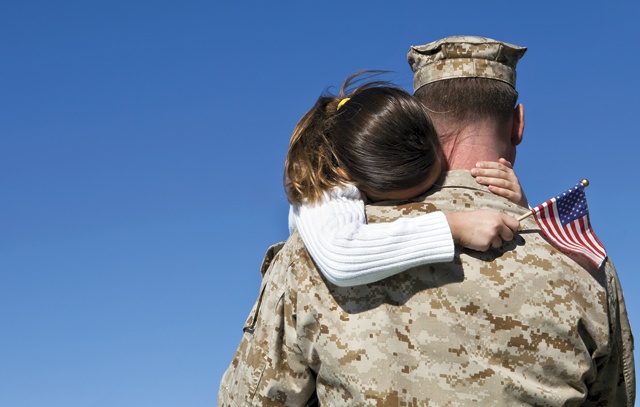Texas has 1.7 million veterans, including more than a half-million from the post-9/11 wars. One of the main challenges facing many veterans returning from the Middle East is coping with the effects of head injuries, which are explained here. Also included are resources available to veterans, including educational benefits.
Post-Traumatic Stress Disorder
PTSD is an anxiety disorder induced by exposure to a traumatic event, such as witnessing injury or death. Symptoms include re-experiencing the event in nightmares or flashbacks, hyperarousal (irritability, anger or hypervigilance, for example) and diminished responsiveness to or avoidance of stimuli associated with the trauma.
Traumatic Brain Injury
TBI is caused by sudden trauma to the head and is commonly sustained by soldiers exposed to explosions. Symptoms include a decreased level of consciousness, amnesia or neurological abnormalities.
By the Numbers
2,000,000—U.S. troop deployments to Iraq and Afghanistan since 2001
500,000—veterans of those wars seen by the Department of Veterans Affairs for health care
103,500—veterans with PTSD (did not have TBI but many had other conditions)
8,700—veterans with TBI (did not have PTSD but many had other conditions)
26,600—veterans with both PTSD and TBI
Source: Congressional Budget Office study February 2012. Figures do not include active-duty personnel treated by the military.
2,128—deaths in Operation Enduring Freedom (Afghanistan)
4,422—deaths in Operation Iraqi Freedom
49,667—total wounded in action in both wars
Source: Department of Defense, updated October 10
12.1 percent—unemployment rate in 2011 for post-9/11 veterans
8.9 percent— unemployment rate in 2011 for general population
Source: U.S. Bureau of Labor Statistics
Texas Veterans
1.7 million from all wars
523,000 from post-9/11 era
Source: 2010 U.S. Census
Texas Resources for Veterans
Veterans Service Offices—Most counties employ a veterans service officer to help with the health, educational or other benefits available to veterans. Hours and staffing vary.
Texas Veterans Commission—This state government agency helps match veterans with employment opportunities, approves educational and training programs, counsels veterans about benefits claims and rights, and makes grants to veterans organizations.
Texas Veterans Leadership Program—Veterans of Iraq and Afghanistan serve as regional specialists across the state to assist vets with employment and readjustment needs. This is a targeted program under the Texas Workforce Commission. To find a nearby specialist, call 1-888-838-8381 or visit the website.
National Veterans Resources
Iraq and Afghanistan Veterans of America—An organization that works on such issues as GI Bill improvements, job hiring measures, suicide prevention and mental health injury screenings. IAVA also compiles informational issue papers and news reports.
Veterans Crisis Line—Connects veterans and their families with U.S. Department of Veterans Affairs responders around the clock. Call the confidential toll-free hotline, 1-800-273-8255, or visit the website for online chat and texting.
Vet-Friendly Education
For many young veterans, starting or completing a college degree program can be a means to employment. The 2011 revisions to the Post 9/11 GI Bill of 2009 expanded and simplified the educational benefits available to veterans who served after the 2001 attacks.
Campuses across Texas welcome these vets, some with special offices to help smooth the college application process, curriculum choices and acquisition of benefits.
At Sam Houston State University in Huntsville, for example, the Veterans Success at Sam office is just steps from the university visitors center. Staffed by two veterans of the Iraq and Afghanistan wars, the small office keeps a couple of computers free for student vets to use on their own.
Robert Stanford, a 30-year-old Army reservist and junior majoring in business, dropped by the office this spring to visit before returning to Afghanistan for another tour of duty. “The professors here let me test out early this semester,” he said. “No drops [dropped classes] necessary. Everything has worked out really well.”
The office helped Stanford receive credit hours for his Army training when he first enrolled. Jacob Bullion, one of the office administrators, said student veterans have “a different maturity level, whine less and are more focused on their studies” than a lot of other students.
Another “vet friendly” campus is Texas State University in San Marcos, where 1,100 veterans are enrolled this year. The Office of Veterans Affairs there handles the full tuition and fees that are paid directly to the school by the federal government. It also assists students with the new GI Bill’s textbook stipend ($1,000 per year) and living expenses payments ($1,357 monthly for the Hays County area).
A socializing organization, the Veteran’s Alliance at Texas State, has been formed to let vets know that they are not alone with their military experiences when they negotiate classes and campus life among 34,000 other students.
——————–
Ed Crowell is an Austin writer.

